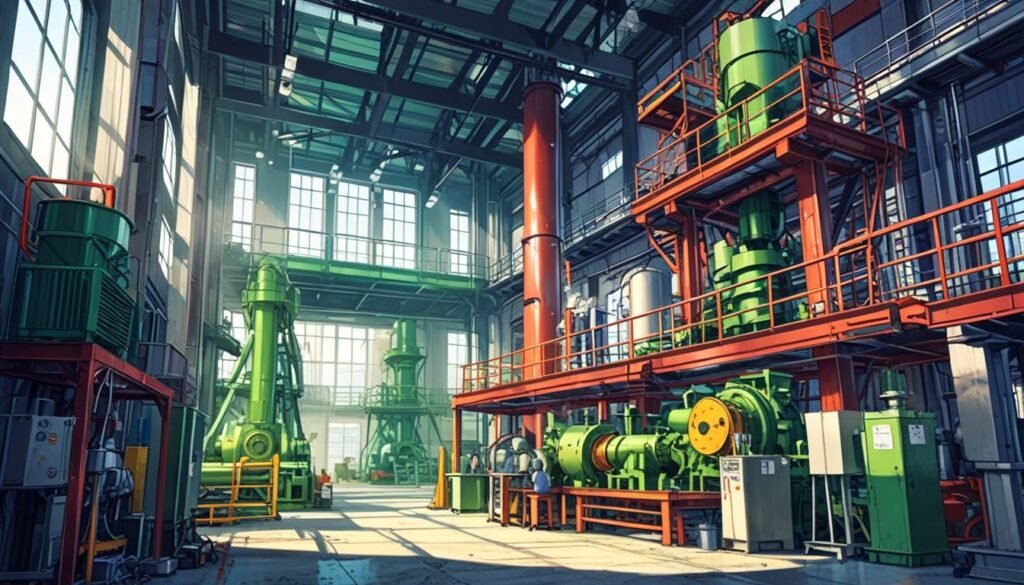**IJmuiden**: Tata Steel Nederland initiates a consultation phase for a transformation programme aimed at enhancing competitiveness and transitioning to low-carbon steel production. The strategy includes significant organisational changes and the commitment to reduce carbon emissions by 5 million tonnes annually by replacing blast furnaces.
Tata Steel Nederland has recently submitted a Request for Advice to the Central Works Council, marking the commencement of a consultation phase for a significant transformation programme aimed at refining the company’s long-term competitiveness while transitioning towards more sustainable steel production practices. This initiative comes amidst the backdrop of ongoing challenges within the European steel market.
Located in IJmuiden, a strategically important steel production site in the Netherlands, Tata Steel benefits from its proximity to a deep-sea port and key industrial clients. The facility’s access to offshore wind sources, transmission lines, and pipeline infrastructure positions it favourably for a shift towards low-carbon steel production, an effort that is currently being discussed with the Dutch government and various stakeholders to expedite the transition.
For the fiscal year 2025, Tata Steel Nederland’s operations have rebounded close to full production capacity, achieving 6.75 million tonnes of liquid steel partly due to the completion of essential maintenance on one of the plant’s blast furnaces. Despite this recovery, the European market faces significant difficulties, including geopolitical tensions, trade disruptions, and rising energy costs, all of which impact the company’s financial performance and cost structure.
In response to these market dynamics, Tata Steel Nederland is rolling out a comprehensive transformation strategy focused on enhancing production efficiency, lowering fixed costs, and realigning its product portfolio with current market demands to improve profitability and resilience. This ambitious plan includes restructuring the organisation to adopt a more agile model that emphasises clearer accountability, standardised processes, enhanced automation, and the elimination of overlapping roles, leading to an expected reduction of roughly 1,600 management and support positions. Moreover, revisions will be made within the local leadership team.
The formal consultation process has commenced with the Central Works Council and relevant trade unions being informed of the changes. Discussions with employee representatives will continue over the coming weeks as Tata Steel Nederland aims to refine and finalise the proposed transformations.
Tata Steel Nederland is highly invested in transitioning to green steel production. The company’s plans include the replacement of one of its existing blast furnaces with a Direct Reduced Iron (DRI) unit and an Electric Arc Furnace (EAF) by the end of the decade. This transition is projected to reduce carbon emissions by approximately 5 million tonnes annually. In addition, Tata Steel is exploring further initiatives to exceed regulatory requirements and improve environmental conditions for nearby residential areas.
T. V. Narendran, CEO & Managing Director of Tata Steel and Chairman of Tata Steel Nederland’s Supervisory Board, remarked, “Our aim is to re-establish Tata Steel Nederland as one of Europe’s most efficient and advanced steel producers. This transformation will help create a strong foundation for the future, combining operational excellence with sustainable practices. We are actively working with the Dutch government and partners to support the green steel transition.”
Hans van den Berg, CEO of Tata Steel Nederland, emphasised the necessity of the changes: “This is a difficult but necessary step towards creating a more sustainable and competitive company. We understand the potential impact on our people and are committed to supporting them throughout this process. Our goal is to create a resilient business that can thrive in all market conditions while contributing positively to the environment.”
As one of the leading global steel companies, Tata Steel has an annual crude steel capacity of 35 million tonnes and operates across five continents, reporting a consolidated turnover of approximately US$27.7 billion for the financial year ending March 31, 2024. The company’s global workforce exceeds 78,000 employees.
Tata Steel is pursuing ambitious sustainability objectives, aiming for Net Zero by 2045 and undergoing a digital transformation toward becoming a leader in ‘Digital Steelmaking’. Its facilities in Jamshedpur, Kalinganagar, and IJmuiden have received the World Economic Forum’s Global Lighthouse recognition, underlining the company’s commitment to innovation and sustainability.
Recognised for its efforts in diversity, equity, and inclusion, Tata Steel has also been acknowledged in various national and international forums, enhancing its reputation as a responsible corporate player in the global steel industry. Throughout its history, the company has accumulated numerous accolades, reflecting its dedication to excellence in performance, sustainability, and innovation within the steel sector.
Source: Noah Wire Services

